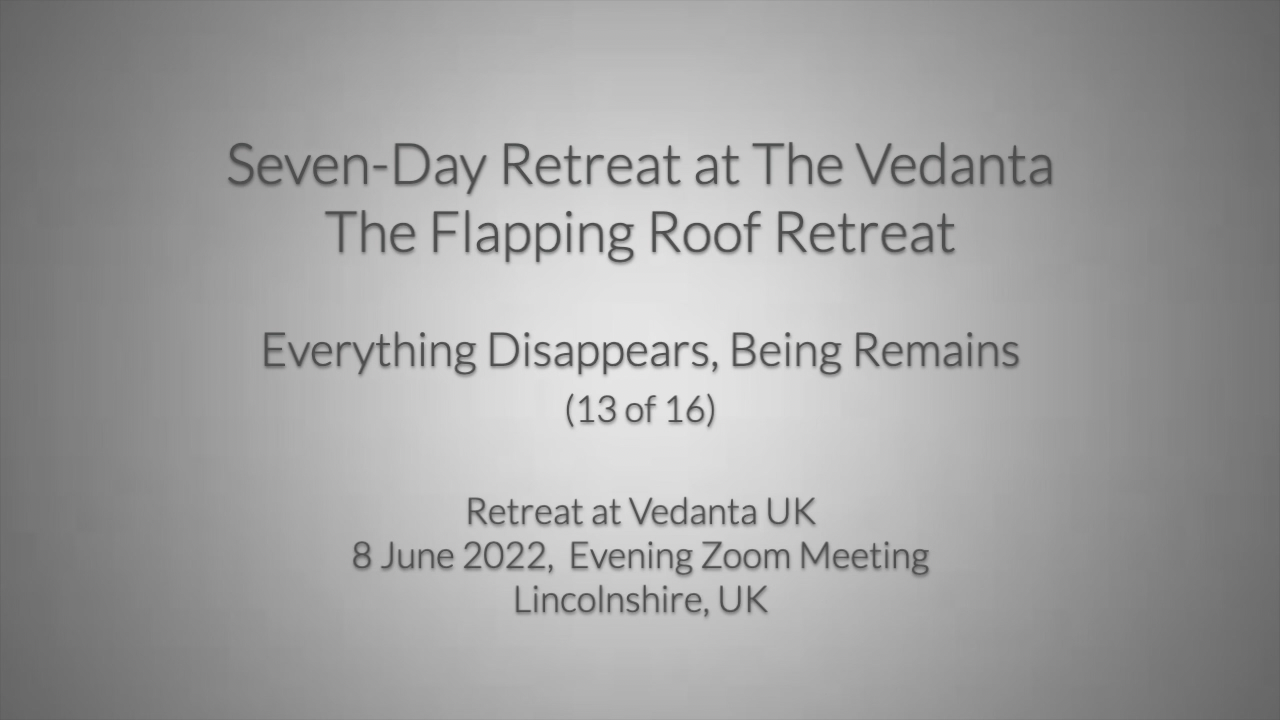
Wednesday 08 June 2022
00:39
A man asks about purpose and living his soul’s purpose. Rupert suggests this approach is not about trying or effort. It is about recognition, and then alignment with that recognition, which is a process. Recognise who you essentially are. Your life purpose is to recognise the nature of ‘I’.
5:37 mins
06:16
A man recently had a seizure and was diagnosed with a brain tumour. He had the surgery, is now home and wants to understand about letting go. Rupert suggests that it is not about making an effort. Your being is present as yourself, so it is about letting go of everything that is not essential to your self. In letting go of everything, being remains. Rest in the 'I am' as the 'I am'.
5:12 mins
11:28
A woman whose partner is ill and dying, remarks that she has felt extremely tearful. Rupert suggests that the tears are inevitable. He references two types of tears: those that run from the inside of the eye that taste bitter – tears of anger – and tears that flow from the outside of the eye – tears of love. Rest with your partner in your shared being. It is the greatest gift you can give one another.
4:13 mins
15:41
A man asks about his experience of meditation regarding sensation. Rupert uses the image and screen metaphor to speak to this. What we thought was an independently existing object – the body – is found to be consciousness. However, the Vedantic and Tantric approaches lead to the same place.
7:27 mins
23:08
A man says we are all aware ‘I am’ but wonders how we know that that ‘I am’ is infinite. Rupert leads him self-enquiry to the experience of being.
5:08 mins
28:16
A woman asks, ‘What is the difference between attention and awareness?’ Rupert says that attention is directing awareness towards an object. Focused awareness is attention. He uses the metaphor of the screen and image to elucidate that awareness and attention are the same thing, both moving and unmoving. Attention is the stretching of our being towards something other than our being.
13:33 mins
41:49
A man says that he feels himself contract when he feels love. Rupert says he feels that because love is the disappearance of the sense of separation and is felt by the ego as its death. Love is the death of the separate self. Like the moth to the flame, the moth can't experience the flame. It must cease to be and become the flame.
4:58 mins
46:47
A woman asks for a better understanding of the ego. Rupert says that the ego is a mixture of the only self there truly is, plus the content of experience – thinking, feeling, sensing, and so on. The separate self tends to believe that the awareness we are is limited to our faculties of perception, which is a natural development.
7:15 mins
54:02
A man asks, ‘Is self-abidance the same as finding happiness?’ Rupert responds yes. Self-abidance is often preceded by a moment of investigation. At first, in contrast to the content of experience, it may feel neutral, but in time, if will emerge more and more as peace, quiet joy and love.
4:28 mins
58:30
A woman asks about defocussing. Rupert suggests that it’s only when we trace our way back to the objects in the foreground from the awareness in the background.
9:56 mins
Sign up for a free account.
Your 14 day free trial has ended.
Please subscribe to continue enjoying everything the site has to offer.
For your safety, please confirm your dietary requirements & emergency contact details below for your upcoming event